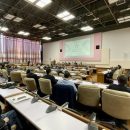Financing and governance are discussed in the 10th axis of the CRES+5

The meeting aims to continue with the actions discussed at the III Regional Conference on Higher Education in Latin America and the Caribbean. The event will take place in Brasilia (DF) between March 13th and 15th.
Covering public, private and mixed modalities, Thematic Axis 10 of CRES+5 – the follow-up meeting to the III Regional Conference on Higher Education in Latin America and the Caribbean (CRES) – focuses on the historical and emerging challenges that condition the provision of resources as well as the institutional and political management of the higher education system in Latin America and the Caribbean.
In the area of funding, it analyzes factors such as the evolution of models and amounts of funding for higher education in the region. The current distribution of funding sources according to their origin and the different models of public aid are also discussed, as well as the possible risks that can be faced in situations of low investment.
Regarding the governance, the reflections revolve around the management of the regional higher education system, the coordination and network collaboration initiatives that already exist and other measures that can be taken to improve coordination, participation, planning and the implementation of decision-making processes at different levels.
Since financing and governance go hand in hand, the main challenge of Axis 10 is to come up with effective and efficient strategies for the education system. This will enable to have the organizational capacity and resources to guarantee quality, relevant and relevant higher education for all.
Participants
Those responsible for the debate on Thematic Axis 10 are: Franco Bartolacci, rector of the National University of Rosario; Jorge Calzoni, rector of the National University of Avellaneda (Argentina) and member of the Executive Council of the Union of Universities of Latin America and the Caribbean (Udualc); Pablo Beltrán Ayala, president of the Council of Higher Education of Ecuador; and Rodrigo Arim, rector of the University of the Republic (Uruguay).
Base document
The base documents drafts resulting from the activities of the Working Groups (WGs) responsible for each thematic axis of CRES+5 are now available. The fourth preparatory meeting for the Conference took place in Havana, Cuba, on February 7th and 8th. The drafts of these documents were discussed, the final version of which must be prepared by the WGs and made available on the CRES+5 website by March 6th.
CRES+5
The III CRES follow-up meeting is being organized by the Ministry of Education (MEC), through the Secretariat for Higher Education (Sesu) and the Coordination for the Improvement of Higher Education Personnel (Capes), and by the UNESCO International Institute for Higher Education in Latin America and the Caribbean (UNESCO IESALC).
The Conference’s target audience are rectors, directors, academics, workers, students, higher education networks, associations and professionals, research centers, trade unions, representatives of governmental and non-governmental organizations and all those interested in higher education on the continent.
CRES
The III Regional Conference on Higher Education- held in Córdoba (Argentina) in June 2018- adopted a Declaration and Action Plan 2018-2028. After the World Conference on Higher Education in 2022, the region’s higher education actors assessed the need to hold a follow-up meeting to the III CRES, in order to promote a participatory process that would highlight the progress made, as well as the remaining challenges and emerging issues, especially related to the Covid-19 pandemic.
Thus, the CRES+5 will be the materialization of this decision. It will enable to analyze the achievements of higher education in Latin America and the Caribbean and, at the same time, establish priorities for the next Regional Conference on Higher Education- scheduled for 2028.
MEC Social Communication Office, with information from Sesu and UNESCO IESALC








